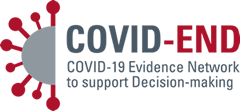Sustaining working group
This working group examines how systems, institutions and methods can be strengthened and sustained to enable evidence synthesis to most effectively serve its key role in the evidence ecosystem so that we are even better prepared for future pandemics and other challenges
Terms of reference
- Retrospectively study how well the systems, institutions and methods of the pre-existing evidence ecosystem responded to the ‘stress test’ presented by COVID-19
- Prospectively study how the evidence synthesis community’s newly developed systems, institutions and methods (including COVID-END as a time-limited network) are being put in place and will contribute to the evidence ecosystem’s ability to respond to any future pandemics
- Propose ways to ‘mainstream’ and enable sustainability over time of emergent systems, institutions and methods
- Use this opportunity of heightened public awareness to build a more fit-for-purpose evidence ecosystem that meets stakeholders’ expectations
- Liaise with stakeholders, including funders. to explore how to best position COVID-END as a ‘case’ that demonstrates the value of a more joined-up, collaborative evidence ecosystem and what evidence they would find valuable to help make the case for investment
Participants
- David Gough, EPPI Centre, UK (co-chair)
- Elie Akl, Systematic Review Centre for Health Policy and Systems, AUB, Lebanon (co-chair)
- Amena El-Harakeh
- Denis Roy, Institut national d'excellence en santé et en services sociaux (INESSSS), Canada
- Heather Husson, McMaster University, Canada
- Ian Graham, Ottawa Hospital Research Institute and University of Ottawa, Canada
- Kim Sutherland, Agency for Clinical Innovation, Australia
- Sylvia de Haan, Cochrane, Switzerland
- Tanja Kuchenmuller, World Health Organization Regional Office for Europe
- Secretariat: Safa Al-Khateeb, McMaster Health Forum and Jeremy Grimshaw, Ottawa, Hospital Research Institute, Canada
Meeting documents
| Meeting date | Documents |
| October 27, 2021 | |
| September 15, 2021 | |
| June 9, 2021 | |
| May 12, 2021 | |
| March 10, 2021 | |
| February 10, 2021 | |
| January 13, 2021 | |
| December 16, 2020 | |
| December 2, 2020 | |
| November 4, 2020 | |
| October 21, 2020 | |
| October 7, 2020 | |
| September 23, 2020 | |
| September 9, 2020 | |
| August 26, 2020 | |
| August 12, 2020 | |
| July 29, 2020 | |
| July 15, 2020 | |
| July 08, 2020 | |
| June 24, 2020 | |
| June 17, 2020 | |
| June 10, 2020 | |
| June 3, 2020 | |
| May 27, 2020 | |
| May 20, 2020 | |
| May 13, 2020 | |
| May 1, 2020 |
Glance at our guide to key COVID-19 evidence sources to stimulate your thinking about how we can sustain the efforts that strengthen institutions and processes ‘behind these sources’ so that we are even better prepared for future challenges.
Search our guide to key
COVID-19 evidence sources
